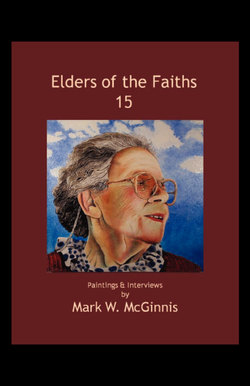Читать книгу Elders of the Faiths 15 - Mark McGinnis - Страница 4
На сайте Литреса книга снята с продажи.
Ted Blakey
Оглавлениеborn 1925
Ted Blakey has been a life-long member of the African Methodist Episcopal Church. He has been a businessman in Yankton, South Dakota, where he worked concurrent careers in janitorial service, pest control, and as a bail bondsman. He is now semi-retired.
Question: What is your spiritual tradition and how does it form a fou ndation for your life?
Answer: I grew up in a family of eleven children and we were taught the Golden Rule — do unto others as you would have them do unto you. My father used to say that without discipline you have nothing. I have grown up with these ideas as the basis of my life. I have found that these two things, discipline and love for others in your heart, is all you really need.
Q: How has your religion and religious practice given meaning to your life?
A: My religion is everything to me. I live to serve my Lord, to bear witness to him with word, song, and deeds. I’m sure I don’t do as well as I should, but I am trying. I sing and my wife plays piano. When people call on us to perform it is a privilege to sing praises to God. The Lord has prospered me so well that I gladly do anything I can to witness and help others as much as I can.
Q: What do you believe are the most important values to uphold and promote?
A: Again, the Golden Rule, not only in your religious and personal life but also in business. I believe in total and complete honesty. I also believe we need to be very considerate of other people’s feelings and show others respect. I remember when we were children and sold vegetables from house to house, whenever the door was answered we always removed our headwear and greeted with a hello. To this day when I go to an office to talk with a lady, I always remove my hat. And if I meet a quite elderly lady on the street, I tip my hat to her. It’s just simple respect and discipline.
Q: What has given you the most joy in your life?
A: Serving Jesus and helping others has given me the most joy. I also was very satisfied when the NAACP asked me to form a committee in South Dakota to help defeat the poll tax which kept poor people from voting, and our efforts were successful. Living here in Yankton I have had many opportunities that an African-American may not have had in other areas of the country. I have belonged to many civic organizations and in some cases been among the first Black people in the nation to be an officer in some of these groups. I have been blessed with many good friends.
Q: What has given you the most sorrow in your life?
A: In 1981 my first wife passed on. She had five and a half months between finding out she had cancer and her death. In that time she let me know she was confident that she was going to a wonderful new life. So even in the great sorrow of her death was the comfort of the Lord.
Q: What are your hopes for the future?
A: I hope we can strengthen the family and the home. I hope people can return to families that spend time together, that eat together and pray together. Many people want too much in material things and too little in real family unity. Some people seem too busy trying to impress their neighbors when they should be trying to impress their children. We need real homes for our children — homes of care, love, and discipline. If you bring up a child in the way you should, when he’s old enough to go out on his own, things will be all right.
Q: If there was one thing you could communicate to youth, what would it be?
A: I would like young people to understand that their dreams for the future are important — that they can have their own vision and follow it. We cannot lose any more generations of our young people to crime, sex, and drugs. We must help them to a better life.
